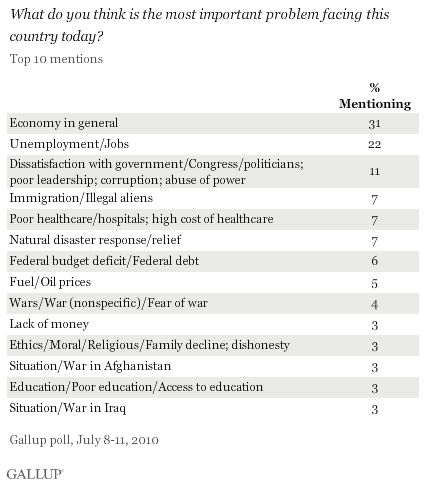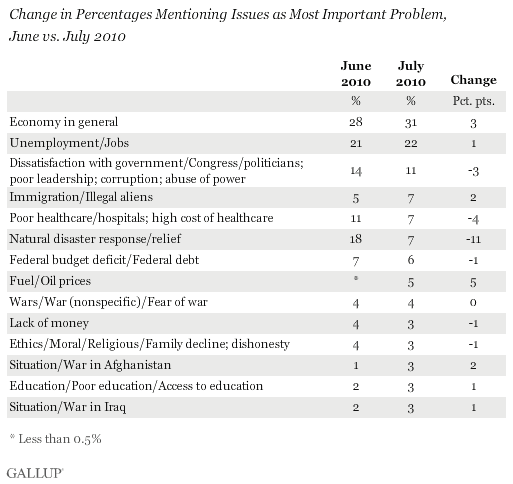PRINCETON, NJ -- Americans name the economy in general and the jobs situation specifically as the top problems facing the country today. Top-of-mind mentions of "natural disaster response and relief" efforts are down significantly after spiking in June.

Americans' perceptions that the economy or jobs are the nation's top problem have been a constant since early 2008. At this point, 64% of Americans mention some aspect of the economy as the top problem, compared with 22% as recently as October 2007.
While the oil spill in the Gulf of Mexico certainly remains in the news, the percentage of Americans mentioning natural disaster relief as the nation's top problem settled to 7% this month, after jumping to 18% in June from 1% in May.
Americans' reduced likelihood to see the spill as the top problem could reflect the reality that the spill is no longer "new" news or perhaps that Americans are becoming more confident that the spill will be fixed.

Other significant findings this month:
-
The only non-economic issue that 10% or more of Americans mention is dissatisfaction with government and politicians (11%).
-
Mentions of fuel and oil prices (5%) as the nation's top problem are the highest since October 2008.
-
The percentage of Americans mentioning healthcare is down to 7%, continuing a recent downtick in top-of-mind concerns about healthcare, and the lowest reading since April 2009. During the congressional battle over healthcare reform legislation in February, 23% of Americans named healthcare as the top problem.
-
Economic issues top the list of most important problems across all political groups. Republicans and independents are most likely to mention the economy in general, while Democrats tilt toward mentioning jobs.
-
Republicans are much more likely than independents or Democrats to mention dissatisfaction with government as the top problem.
-
Both Republicans and independents are more likely to mention immigration than are Democrats.
Bottom Line
Americans' views of the most important problem facing the country continue to reflect significant worries about the economy. This confirms Gallup's ongoing economic confidence measures, which in recent weeks have become more negative. Although the precise percentage of Americans mentioning economic concerns varies from month to month, these issues have dominated the public's consciousness for well over two years. This fact should serve as a sharp reminder to politicians and challengers involved in House and Senate races this fall; failure to address economic issues will be at the candidate's own peril.
Results for this USA Today/Gallup poll are based on telephone interviews conducted July 8-11, 2010, with a random sample of 1,020 adults, aged 18 and older, living in the continental U.S., selected using random-digit-dial sampling.
For results based on the total sample of national adults, one can say with 95% confidence that the maximum margin of sampling error is ±4 percentage points.
Interviews are conducted with respondents on landline telephones (for respondents with a landline telephone) and cellular phones (for respondents who are cell phone-only). Each sample includes a minimum quota of 150 cell phone-only respondents and 850 landline respondents, with additional minimum quotas among landline respondents for gender within region. Landline respondents are chosen at random within each household on the basis of which member had the most recent birthday.
Samples are weighted by gender, age, race, education, region, and phone lines. Demographic weighting targets are based on the March 2009 Current Population Survey figures for the aged 18 and older non-institutionalized population living in continental U.S. telephone households. All reported margins of sampling error include the computed design effects for weighting and sample design.
In addition to sampling error, question wording and practical difficulties in conducting surveys can introduce error or bias into the findings of public opinion polls.
View methodology, full question results, and trend data.
For more details on Gallup's polling methodology, visit https://www.gallup.com/.
